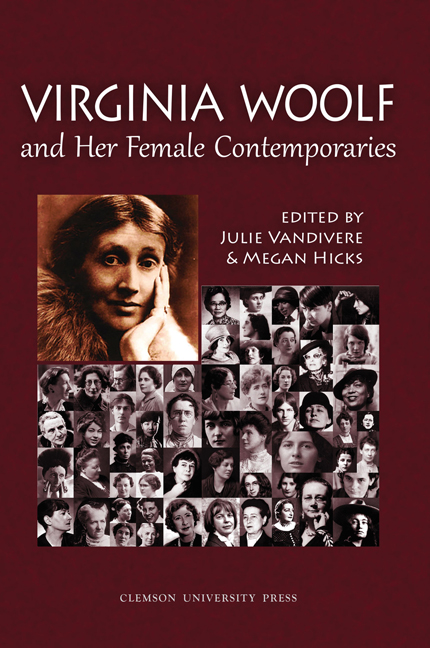Book contents
- Frontmatter
- Table of Contents
- Introduction
- Acknowledgments
- Abbreviations
- Who Are Virginia Woolf's Female Contemporaries?
- Virginia Woolf's Cultural Contexts
- Virginia Woolf's Contemporaries Abroad
- Virginia Woolf's Contemporaries at Home
- “The Squeak of a Hinge”: Hinging and Swinging in Woolf and Mansfield
- “People must marry”: Queer Temporality in Virginia Woolf and Katherine Mansfield
- The Weight of “Formal Obstructions” and Punctuation in Mrs. Dalloway and Pointed Roofs
- Advise and Reject: Virginia Woolf, the Hogarth Press, and a Forgotten Woman's Voice
- Florence Melian Stawell and Virginia Woolf: Home-front Experience, The Price of Freedom, and Patriotism
- Intimations of Cosmic Indifference in Virginia Woolf 's Orlando and Olive Moore's Spleen
- “Could I sue a dead person?”: Rebecca West and Virginia Woolf
- Splintered Sexualities in Rebecca West's The Return of the Soldier, Virginia Woolf 's Mrs Dalloway, and Sylvia Townsend Warner's “A Love Match”
- Sexual Cryptographies and War in Virginia Woolf 's Between the Acts and Elizabeth Bowen's The Heat of the Day
- Tribute to Jane Marcus
- Notes on Contributors
- Conference Program 223
Splintered Sexualities in Rebecca West's The Return of the Soldier, Virginia Woolf 's Mrs Dalloway, and Sylvia Townsend Warner's “A Love Match”
from Virginia Woolf's Contemporaries at Home
- Frontmatter
- Table of Contents
- Introduction
- Acknowledgments
- Abbreviations
- Who Are Virginia Woolf's Female Contemporaries?
- Virginia Woolf's Cultural Contexts
- Virginia Woolf's Contemporaries Abroad
- Virginia Woolf's Contemporaries at Home
- “The Squeak of a Hinge”: Hinging and Swinging in Woolf and Mansfield
- “People must marry”: Queer Temporality in Virginia Woolf and Katherine Mansfield
- The Weight of “Formal Obstructions” and Punctuation in Mrs. Dalloway and Pointed Roofs
- Advise and Reject: Virginia Woolf, the Hogarth Press, and a Forgotten Woman's Voice
- Florence Melian Stawell and Virginia Woolf: Home-front Experience, The Price of Freedom, and Patriotism
- Intimations of Cosmic Indifference in Virginia Woolf 's Orlando and Olive Moore's Spleen
- “Could I sue a dead person?”: Rebecca West and Virginia Woolf
- Splintered Sexualities in Rebecca West's The Return of the Soldier, Virginia Woolf 's Mrs Dalloway, and Sylvia Townsend Warner's “A Love Match”
- Sexual Cryptographies and War in Virginia Woolf 's Between the Acts and Elizabeth Bowen's The Heat of the Day
- Tribute to Jane Marcus
- Notes on Contributors
- Conference Program 223
Summary
Chris Baldry in Rebecca West's debut novel The Return of the Soldier, published in 1918, Septimus Warren Smith in Virginia Woolf 's Mrs. Dalloway, published in 1925, and the siblings Justin Tizard and Celia Tizard in Sylvia Townsend Warner's “A Love Match,” published initially in the collection of stories A Stranger with a Bag in 1961, are the focus of this argument. In addition to their more conventional experiences relating to the war, each of these characters struggles with traumatically induced sexual attractions and behaviors caused either by direct exposure to the Great War or by side effects of the war. I am provisionally terming these responses “sexual dysphoria,” dysphoria being a mental condition that typically includes such factors as unease, anxiety, generalized dissatisfaction, or even subclinical depression. The term should be understood as descriptive rather than pejorative. In these works, sexual dysphoria is apparent both in episodes of sexual desire and in sustained love relationships that defy conventional and cultural constraints. These instances of sexual dysphoria—which include the sense of confusion or inappropriateness—are offset by moments of intense sexual or emotional euphoria, a feeling or state of concentrated arousal, excitement and happiness.
When the male characters return to England from their exposure to the war zone, their sexual identities have been significantly altered by the trauma. Justin's sister, Celia Tizard, manifests her own form of sexual dysphoria and, although she did not witness the warfare, experiences the dual impact of the death of her fiancé at the Front and her brother's struggle with his war-induced post-traumatic behaviors upon his return. Significantly, two of the three works—The Return of the Soldier and Mrs. Dalloway—focus not only on the psychological damage that has been inflicted by the war but on some of the “cures” that were used to treat damaged men struggling with their post-war mental injuries, while “A Love Match” makes no reference to such treatments.
The Return of the Soldier, West's first novel, was conceived in 1915 and written mostly in 1916 though not published until 1918, the last year of the war. It was well received in both Britain and the United States, and, though certainly disturbing and provocative, the novel was not regarded as particularly transgressive at the time of publication since the narrative focuses exclusively on heterosexual attractions, however disruptive they might be.
- Type
- Chapter
- Information
- Virginia Woolf and Her Female Contemporaries , pp. 196 - 201Publisher: Liverpool University PressPrint publication year: 2016



